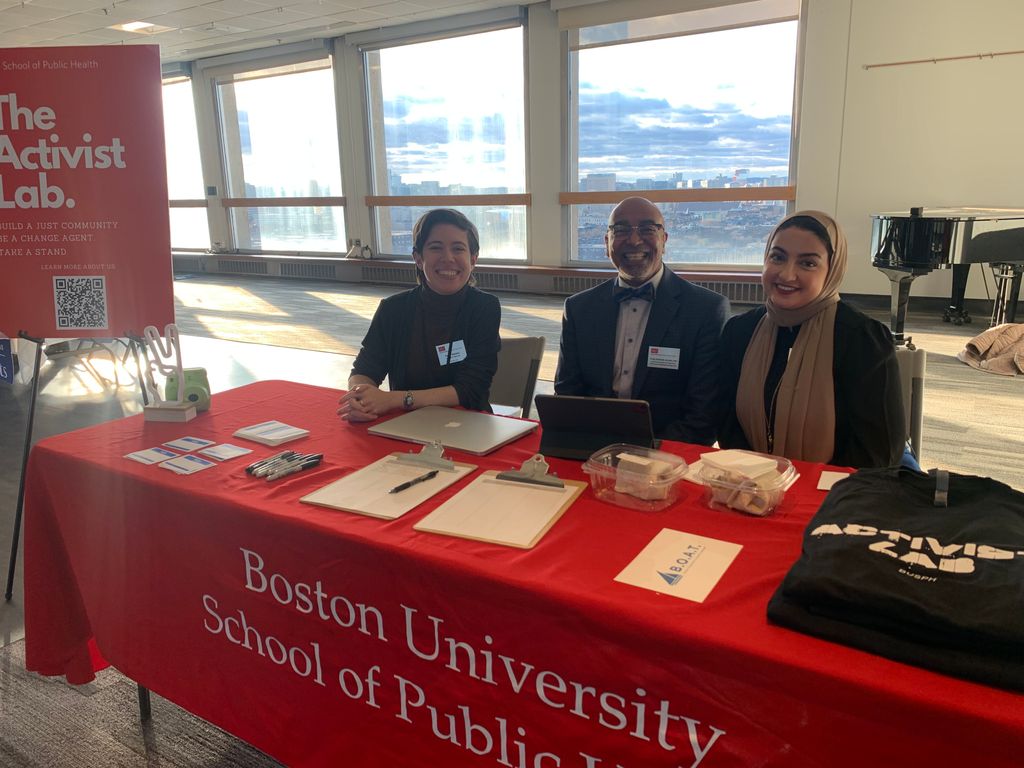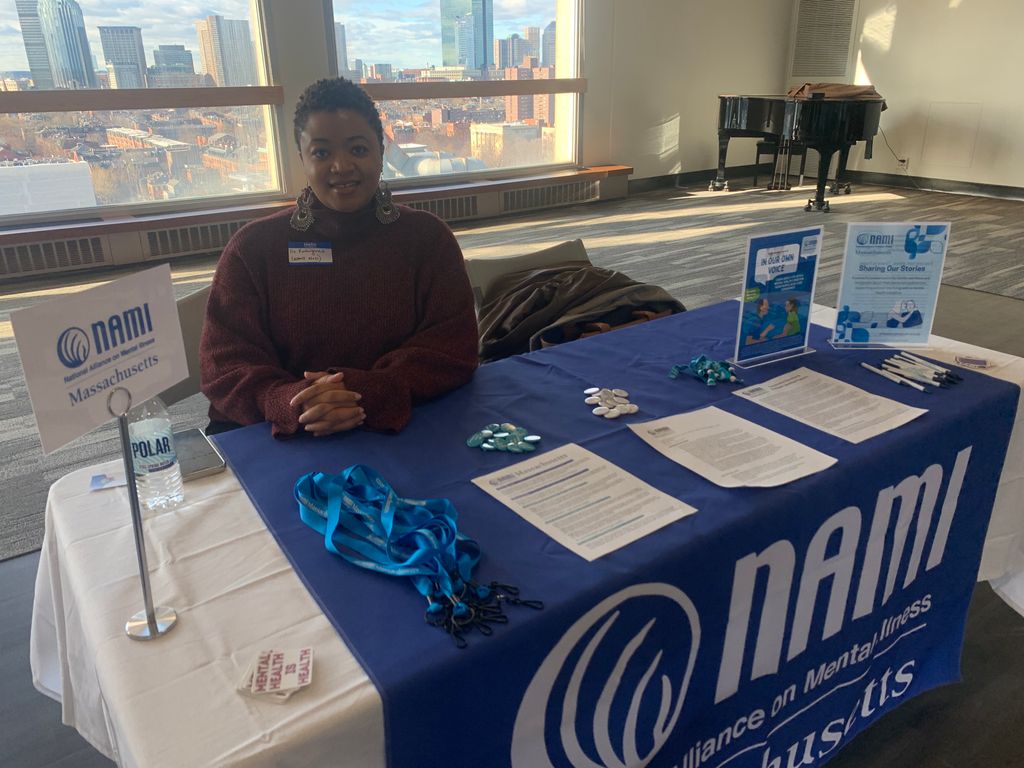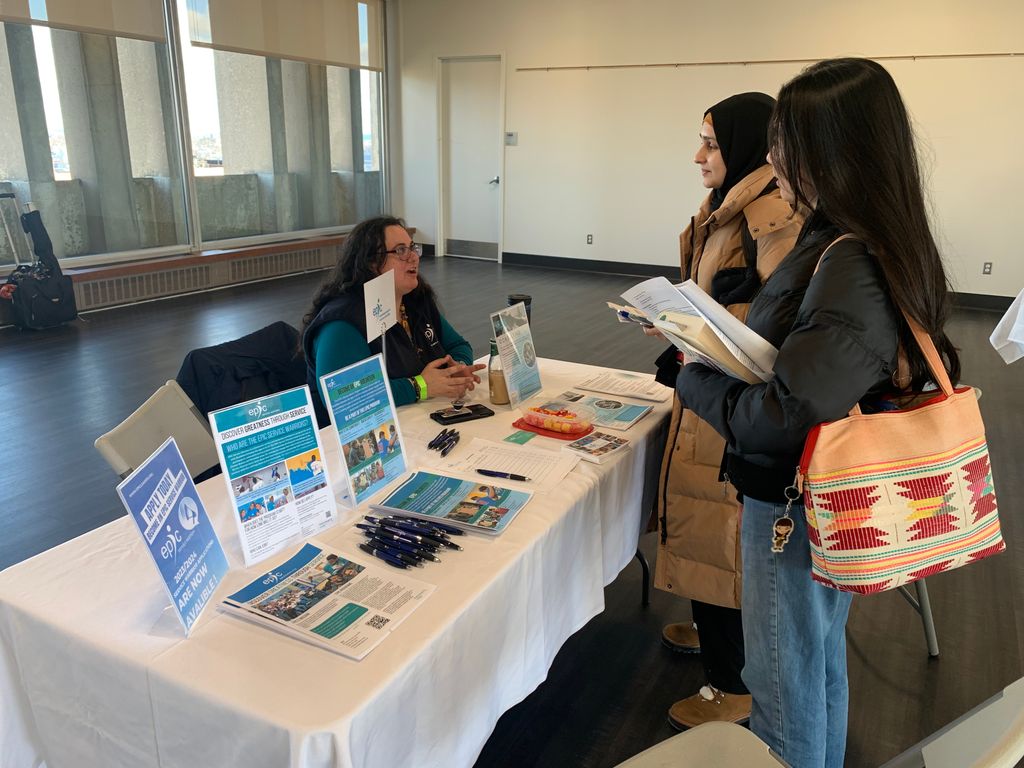Activist Lab Meet & Greet Fosters Inclusive Partnerships.

Activist Lab Meet & Greet Fosters Inclusive Partnerships
On March 15, the Activist Lab invited SPH students, faculty, and staff to join local organizations serving people with disabilities for an evening of informal networking in Hiebert Lounge. The Disability Justice Meet & Greet featured representatives from seven area nonprofits.
“Nothing about us without us.”
Popularized by disability activists in the 1990s to highlight their fight against ableist discrimination, this motto has become a powerful rallying cry for the global disability justice movement—a distillation of the movement’s message that people with disabilities are the experts in their own lives and should be fully included in all matters that affect them.
With this sentiment in mind, on March 15, the Activist Lab invited SPH students, faculty, and staff to join local organizations serving people with disabilities for an evening of informal networking in Hiebert Lounge. The Meet & Greet was the third in an ongoing series designed to bring those “less seen and less heard” into academic spaces, says Craig Andrade, associate dean for practice and director of the Activist Lab. Partnership with communities of color was the focus of the first Meet & Greet last April, LGBTQ+ health and advocacy took the spotlight at the second in October, and the most recent event was dedicated to disability justice.
This was perfect for Emma Reiner, a student of health, law, and policy who has some experience in disability justice and would like to do more. She currently works part-time as an administrative coordinator for the geriatrics department at Boston Medical Center (BMC) and last summer she interned for a global health nonprofit serving children with disabilities.
“My job search so far has been either Zoom meetings with professors or just applying to jobs online—it’s been very solitary in a way,” says Reiner, who is graduating this spring. “I saw this event was happening… I thought it would be nice to get out and meet people.”
The Meet & Greets are deliberately informal and invitations are open-ended.

“We want to bring in faculty, staff, and students with interest in that content area and help them engage with the community, whether that be partnering on research, connecting in classrooms, practicum opportunities, or even just brainstorming on how we might work together to address challenging issues,” says Andrade. “What can we learn from each other and how can we collaborate in ways to make the world better?”
The Disability Justice Meet & Greet featured representatives from seven area non-profits including: Boston Outpatient Assisted Treatment (BOAT), Boston Center for Independent Living, Empowering People for Inclusive Communities (EPIC), Lurie Institute for Disability Policy at Brandeis University’s Heller School, MassFamilies, National Alliance on Mental Illness Massachusetts (NAMI Mass), and Vinfen.
BOAT, a mental health treatment pilot program, came to SPH looking for practicum students to join its evaluation team. Housed within the department of psychiatry at BMC and run in partnership with the Boston Municipal Court, BOAT helps clients with a pending criminal case and a diagnosis of a serious mental illness achieve recovery in the community.
“This type of treatment has not been offered before in Massachusetts so we’re trying out something new,” says Lucinda Shotts, a program coordinator and research assistant at BOAT. “We hope to reduce recidivism, reduce hospitalizations.”
The program is in its third year and graduating many of its clients, says Shotts. Funding from the Substance Abuse and Mental Health Services Administration will enable BOAT to monitor their treatment outcomes.
“We’re looking for help doing assessments of patients and data analysis, both qualitative and quantitative,” says Shotts, who herself started as a part-time intern at BOAT. Now, she will graduate from undergrad already having a full-time job.

NAMI Mass is also hiring, and “always looking for more volunteers,” says Dr. Myisha Rodrigues, executive director of the mental health organization which seeks to improve the lives of people affected by mental illness through education, support, and advocacy. NAMI has two signature volunteer programs, “In Our Own Voice” and “Sharing our Stories.” The first is for folks with lived experience to share their experiences and the second focuses on the experiences of families, caregivers, and loved ones of people with mental illness. Opportunities branch out from there, says Rodrigues. Volunteers can undergo training to become support group facilitators, or they can participate in one-off opportunities like NAMIWalk, an upcoming fundraiser in Artesani Park on May 20th.
Krystal Linn, a youth programs specialist with EPIC echoes Dr. Rodriguez’s appeal for volunteers. An initiative of Triangle, Inc., a nonprofit serving people with disabilities of all ages, EPIC focuses on empowering transitional age youth with disabilities ages 16 to 23. EPIC Service Warriors give a year of their lives to community service and with that they learn leadership skills, team building, advocacy, and disability rights and pride, says Linn. Volunteers assist the Service Warriors to perform meaningful community service in the Boston and Worcester areas.

First year MPH students, Summya and Sherly, who asked to use only their first names, came to the Disability Justice Meet & Greet in search of volunteer opportunities like these. The pair became friends after meeting in their core courses. Both enjoyed working with people with disabilities back home; Summya in Pakistan and Sherly in Indonesia.
“Living on campus, doing assignments and readings and things, can be really stressful and this kind of event can help with that,” says Sherly. “I really wanted to know what other things we can do outside campus.”
With 327 programs serving 10,000 people each year across Massachusetts and Connecticut, Vinfen has a wealth of both volunteer and employment opportunities. Kim Shellenberger, chief strategy officer at Vinfen who took down the students’ names and emails.
“The feeling that you get when helping someone is beyond something that you can explain in words,” says Summya. “I am happy we have opportunities here… to do something for the community.”
Those unable to attend the Activist Lab’s Disability Justice Meet & Greet can get more information about the opportunities described here and more through the links and contacts listed below:
Epic – Krystal Linn, Worcester Youth Programs Specialist (klinn@epicleaders.org)
NAMI Mass – Dr. Myisha R. Rodrigues, Executive Director (mrodrigues@namimass.org)
BOAT – Tithi Baul, Director of Evaluation Research in the Department of Psychiatry at BMC and Assistant Professor of Psychiatry at BUSM (tithi.baul@bmc.org) and Nandini Agarwal, Research Data Analyst at BMC (Nandini.agarwal@bmc.org)
Vinfen – Kim Shellenberger, Chief Strategy Officer (shellenbergerk@vinfen.org)
MassFamilies – Raina Kelly, Co-Chair (rania@massfamilies.org)
Lurie Institute for Disability Policy at Brandeis University’s Heller School – Amy Abushanab, Assistant Director (Aabushanab@brandies.edu) and Amanda Lanciault, Student Communications Intern (Amandalanciault@brandies.edu)
Boston Center for Independent Living – Mary-Kate Wells, Pre-Employment Transition Services Coordinator (mkwells@bostoncil.org)
